
Mediterranean Economies 2024
The New Agenda for the Mediterranean: Perspectives and Challenges
edited by Salvatore Capasso and Giovanni Canitano
The 2024 edition of Mediterranean Economies explores the European Union's "New Agenda for the Mediterranean," a transformative framework designed to enhance collaboration and sustainable development with its Southern Mediterranean neighbours. This comprehensive analysis focuses on the agenda’s five key pillars: human development, governance, resilience and prosperity, peace and security, migration and mobility, and the green transition.
Through contributions from leading scholars and policymakers, the book provides in-depth analyses of these interconnected themes, addressing the Mediterranean's shared challenges. Highlights include the geopolitical consequences of the October 2023 Middle East crisis, the growing influence of Russia and China in the region, and infrastructure investments in MENA and Africa amidst G7-BRICS competition. The book also underscores the urgency of tackling environmental degradation, water scarcity, and gender inequalities while examining the intricate dynamics between migration policies and economic growth.
As the Mediterranean faces environmental pressures, socio-economic disparities, and political instability, this book emphasises the need for innovative strategies and regional integration to transform these challenges into opportunities.
Ideal for policymakers, academics, and stakeholders, Mediterranean Economies 2024 provides critical insights and actionable recommendations to foster a more inclusive, sustainable, and prosperous region.
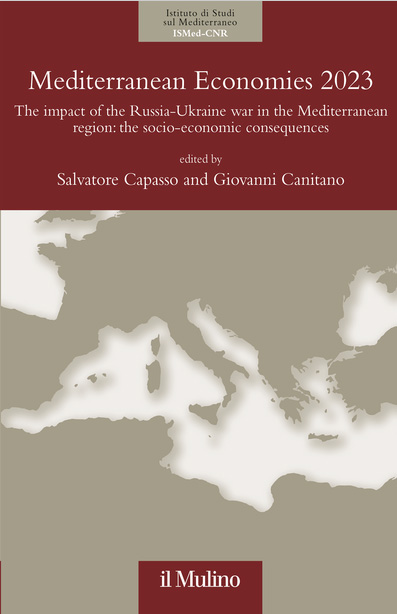
Mediterranean Economies 2023
The impact of the Russia-Ukraine war in the Mediterranean region: the socio-economic consequences
edited by Salvatore Capasso and Giovanni Canitano
Over the last three years, the world's economies have grappled with three major challenges: the COVID-19 pandemic, a significant rise in inflation, and the Russia-Ukraine conflict, which has increased geopolitical tensions. These shocks have had significant negative effects on global economic growth prospects. However, the impact has been uneven, with notable variations, particularly among Mediterranean countries. Fear-driven market responses have deeply affected food and energy supplies. The Russian-Ukrainian conflict caused a rapid surge in wheat prices, hitting levels last seen in 2008. This crisis has extended to higher oil and gas costs, increased transportation and insurance expenses, trade instability, and port disruptions. Bank transfer restrictions with Russia have worsened economic conditions. Globally, the recession amplified economic downturns, decreased employment, transportation, and productivity, resulting in severe disruptions across supply chains. One potential silver lining in the inflation, particularly in commodities like fuel, is that it may compel governments worldwide to seek energy security through sustainable solutions aligned with the United Nations' 2030 Agenda. The Mediterannean Economies 2023 is a collection of essays that analyses the economic, political and social effects of the Russia-Ukraine war in the Mediterranean area.
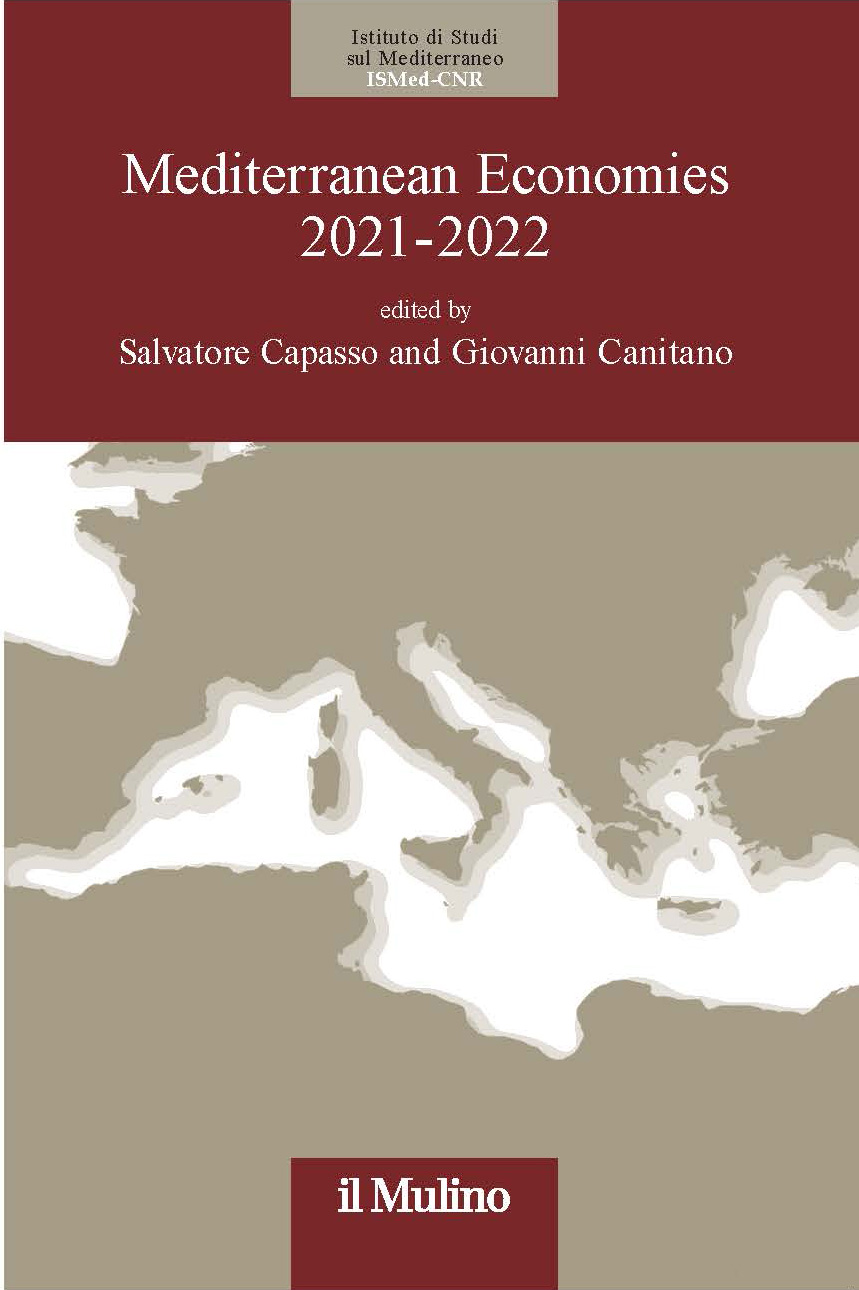
Mediterranean Economies 2021-2022
The Mediterranean after the Calamity: Economics and Politics in the Post-Pandemic World
edited by Salvatore Capasso and Giovanni Canitano
The coronavirus pandemic has shocked the world and its consequences will last for many years. The enormous costs of the pandemic will only be known ex post. While some people will have lost nothing, others will have lost everything, sometimes even their lives. On the positive side, most governments around the globe have started to design optimal policies to face the incredible challenges that lie ahead for the humanity. The geopolitics of the world will change as a result of increasing tensions and conflicts between the great powers such as the United States, China and Russia. The competition between democracy and authoritarianism will intensify; the synergy of market and state will be transformed. It will be particularly dangerous to see two sides of the same coin as alternatives: neoliberal capitalism versus populist capitalism. The Mediterranean Economies 2020 is a collection of essays that analyses the economic, political and social effects of the pandemic on the regions of the Mediterranean area. The results of the investigation carried out highlight that chance for a better future could be created by a gradual transition to a new pragmatism, a strategy of moderation in economic matters, and development that is sustainable on three levels - economic, social and ecological. The pandemic is an enormous challenge for the social sciences, because old ways of thinking often prove useless for analyzing and explaining new scenarios.
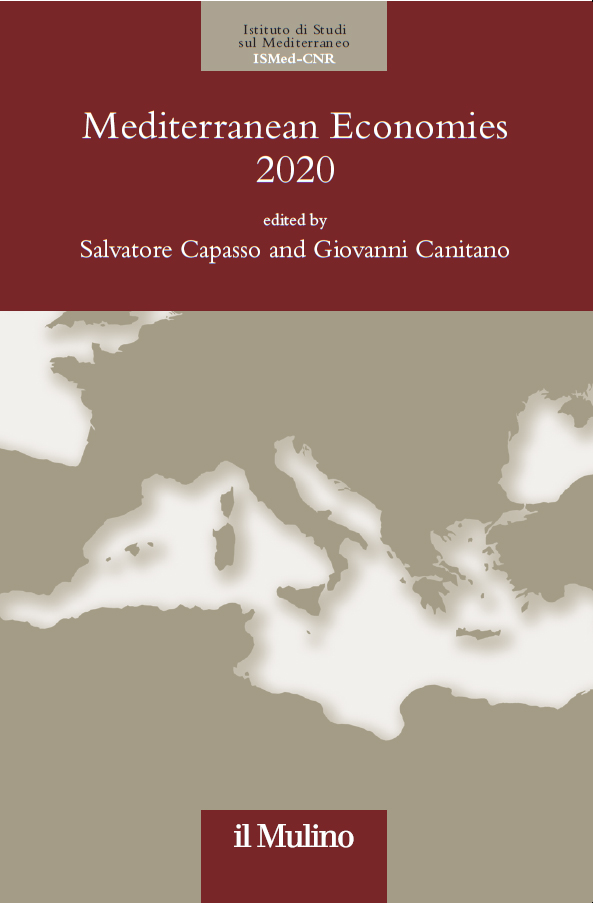
Mediterranean Economies 2020
Mobility of productive factors in the Mediterranean as a driver of development
edited by Salvatore Capasso and Giovanni Canitano
Factor mobility is the soul of the market and the engine that allows economic systems to grow and flourish. Driven by endogenous forces, factors of production – when free to move – flow towards investments offering higher returns, ultimately boosting productivity and growth. And the greater are the differences in returns, the greater is their impact on productivity. The Mediterranean is an area of large inequalities and of major economic and demographic differences, not only between its northern and southern shores, but also within countries and between regions. Here, more than elsewhere, lack of factor mobility undermines growth and development in the entire area. Mediterranean Economies 2020 is a collection of essays that analyse the nature and effects of factor mobility in the Mediterranean. The collection focuses on the socio-economic impact of human capital mobility in the labour market and the specific features of Mediterranean migrations. The book also offers insights into key aspects of goods mobility: the importance of logistics and port infrastructures in the Mediterranean and the dynamics of trade in the basin in recent years.
Mediterranean Economies 2020 is the continuation of the long-standing Rapporto sulle Economie del Mediterraneo, providing an annual overview of the political and economic conditions in the area. Whilst focusing on mobility, this year’s report also describes the impact of the coronavirus pandemic on the economies of the basin, and outlines possible scenarios for recovery.

Rapporto sulle economie del Mediterraneo
Edizione 2019
edited by Salvatore Capasso
Based on the results and open questions of the conference entitled 'Climate change, socio-economic crises and food (in)security: a Mediterranean in transition' organised by the Institute for Mediterranean Studies in memory of Eugenia Ferragina, geopolitical expert and editor until 2018 of the Report on Mediterranean Economies, the 2019 edition focuses on the theme of the environment and analyses in particular the link between the environment, economic growth and political stability in the Mediterranean. In a context characterised by the scarcity of resources that are fundamental for human development, such as water and arable land, and by strong anthropic pressure on resources, climate change is increasingly becoming the determining variable in amplifying the area's crisis factors such as water crisis, food insecurity and migratory flows, all of which contribute to increasing internal instability that threatens to affect all the countries of the Mediterranean region.

Rapporto sulle economie del Mediterraneo
Edizione 2018
edited by Eugenia Ferragina
The 2018 edition of the Mediterranean Economies Report analyses in particular the impact of socio-economic inequalities, territorial imbalances and structural changes in labour markets on Mediterranean migration. Indeed, the depth and extent of the political crisis that has affected the entire area has radically changed the scenario against which the Euro-Mediterranean integration policy was conceived and implemented. With these facts noted, the Report lays the foundations for the development of new models of analysis and policy guidelines capable of responding to the dramatic challenges the Mediterranean regions are facing. In a fragile and conflict-ridden environment, where economic and political variables are closely interrelated and mutually reinforcing, a multidisciplinary approach is needed to represent the structural determinants of migration in an overall picture: imbalances, climate change, unemployment, weak institutions, lack of governance, lack of effective redistributive policies. To overcome this situation, it is necessary to strengthen territorial cohesion, reduce income gaps and improve the access of marginal areas to basic infrastructures: all long-term objectives, for which it is necessary to build an inclusive development model, capable of guaranteeing equal education and employment opportunities for young people and women.

Rapporto sulle economie del Mediterraneo
Edizione 2017
edited by Eugenia Ferragina
On the eve of international and global developments destined to affect the Mediterranean region, and in particular the areas most directly affected by conflict and poverty, this volume offers an up-to-date political and economic analysis of the state of the region. Changes in the labour market, also in the light of the continuing economic crisis and the profound demographic transformations of recent decades; the high rate of youth unemployment - especially among women - not only among the poorly educated, but also among university graduates; the phenomenon of the brain drain, which generates emigration to southern European countries, themselves characterised by a strong incoming migration flow, are some of the key issues. The challenges they pose to international cooperation are manifold, from promoting stable employment to managing the 'structural' emergencies of migration. The new policy strategies, including the Migration Compact plan launched by the European Union, are an important effort to better manage labour-induced migration processes. New development opportunities should be sought in the spread of the green economy, provided that integrated investment policies in innovation and vocational training can be promoted.

Rapporto sulle economie del Mediterraneo
Edizione 2016
edited by Eugenia Ferragina
Once again this year, the Report provides information, updated data and interpretative lines on recent events. After a general introduction, ample space is devoted to analysing the changes in the political scenario: the gradual disengagement of the United States from the Mediterranean, the destabilisation phase in the area with the growing opposition between the Sunni and Shia worlds, and the crisis of the Euro-Mediterranean integration project. An extensive focus is devoted to the migration phenomenon, investigated under various aspects: the turnover between entrances and exits in the labour market, which makes the reception of migrants a form of demographic rebalancing between the two sides of the basin; the elements that characterise the migration system, such as the direction of flows, the duration of migration projects, the qualification of migrants, the impact on the economies of origin geographical fragmentation, which tends to multiply the places of departure and give centrality to those of transit; immigrants' integration processes, which are strongly conditioned by the receiving territorial context; migration seen from the South, i.e. the migration policies of Egypt and Morocco. In the second part, the Report examines the sectors that most influence the development of the area's economies.

Rapporto sulle economie del Mediterraneo
Edizione 2015
edited by Eugenia Ferragina
The Mediterranean Economies Report reaches its 10th edition this year. An original publication in the Italian panorama for the economic and political focus of the essays of which it is composed, in addition to updating the status of the various areas of interest examined, the Report has always proposed interpretative lines, presented facts, and offered up-to-date data, confirming itself as an indispensable tool for those who need to grasp the trends underway. This edition also offers readers a wide-ranging look at what is happening in the Euro-Mediterranean area, to grasp the changes, crises, prospects and expectations for development: migratory flows, economic relations, political transformations, revolts and hopes that have characterised the last ten years of the integration process between the two shores of the Mediterranean. In order to better understand the journey and the transformations that have marked this decade, the 2015 Report offers within the different chapters a summary of the most interesting and original aspects covered in previous editions.

Rapporto sulle economie del Mediterraneo
Edizione 2014
edited by Eugenia Ferragina and Paolo Malanima
The 2014 edition of the Mediterranean Economies Report opens this year with two scenario analyses. The first presents an overview of the new political-institutional systems of the Mediterranean Arab countries updated to 2013, with particular reference to their position on the international scene and their relations with Western countries. The second looks at the Mediterranean in the broader context of the new global economic balances and focuses on Europe before and after the global financial crisis and on Italy's role in the Mediterranean. Another element of originality is a chapter on the 'Mediterraneans of Europe', which presents the Black Sea as a border sub-region historically linked to the Mediterranean. The following chapters deal specifically with the problems of corruption and public spending, demographic convergences and divergences between the two shores of the Basin, the role of migrants' remittances, the appearance of China and India on the Mediterranean scene, the environmental impact of tourism, energy production and consumption, and Mediterranean productivity in times of crisis. Concise and timely analyses, accompanied by an up-to-date statistical appendix, make the Report not only a useful tool for experts from different disciplinary backgrounds, institutions and economic operators, but also an effective teaching tool.
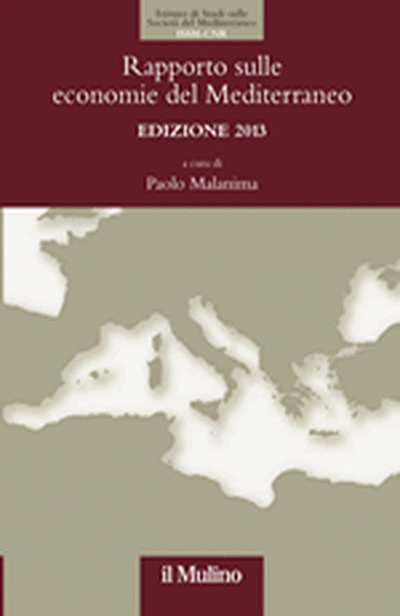
Rapporto sulle economie del Mediterraneo
Edizione 2013
edited by Paolo Malanima
The 2013 edition of the Mediterranean Economies Report is focused on the economic events in the countries of the Mediterranean area in relation to the crisis that has been affecting the entire advanced world since 2008. The repercussions of such a prolonged crisis are also felt by the weaker economies. In some of these, the negative effects of the political events of the 'Arab Spring' are also evident in 2012-2013. After a chapter devoted to developments in Mediterranean economies over the last half century, the other chapters examine the global crisis in the Mediterranean, demography, migration flows, foreign direct investment, the public sector, the environment, and energy. The aim is to provide the reader with the elements to understand current economic events through a summary rich in quantitative information on the 25 countries surrounding the Mediterranean. Each chapter is accompanied by an appendix with up-to-date key economic indicators.

Rapporto sulle economie del Mediterraneo
Edizione 2012
edited by Paolo Malanima
The Mediterranean Economies Report, now in its eighth edition in 2012, is dedicated to economic events and their relations with the 'Arab Spring'; that is, with the uprisings that have affected a number of Arab countries since early 2011. The authors of the Report believe that the global economic crisis on the one hand and the uprisings on the other have different roots and that an oversimplified correlation between the two phenomena is not convincing; however, they believe that it is important to know the economic framework of the ongoing political transformations. After the initial two chapters on economics and politics, the Report examines migration, trade and foreign direct investment, the public sector (in particular public debt), the environment, energy and productivity. As usual, it presents a summary full of quantitative information on the 25 countries surrounding the Mediterranean. In fact, each chapter is accompanied by an appendix with up-to-date key economic indicators, so as to provide the reader with a tool to orientate himself in the current transformations.
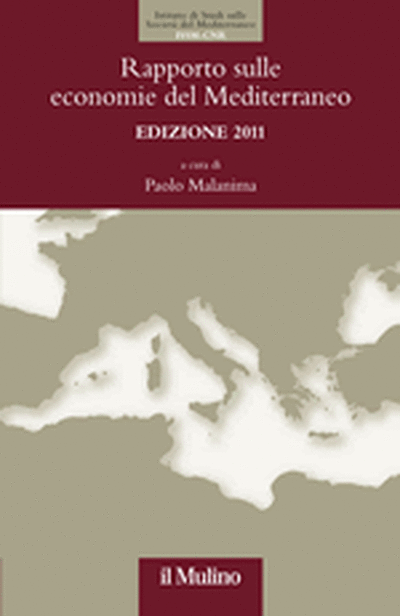
Rapporto sulle economie del Mediterraneo
Edizione 2011
edited by Paolo Malanima
The 2011 Report, now in its seventh edition, again offers an up-to-date reconstruction of the economies of the 25 countries surrounding the Mediterranean. As usual, it presents a summary rich in quantitative information: each chapter is, in fact, accompanied by an appendix with up-to-date key economic indicators. Sustainability and the environment, the central themes of this edition, are treated in the light of the inevitable pressure exerted on them by economic development, pressure derived both from the consumption of regenerable and exhaustible natural resources and from the negative effects - such as pollution - generated by economic activities. In a global and long-term perspective, the increase in per capita incomes and world population thus poses the problem of the sustainability of development, which the Report takes care to point out.
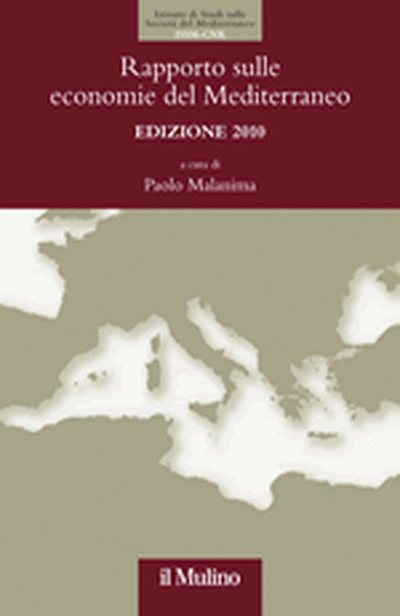
Rapporto sulle economie del Mediterraneo
Edizione 2010
edited by Paolo Malanima
The 2010 Report on Mediterranean Economies could only be dedicated to the effects of the economic crisis. How have different economies been affected? Which sectors were most affected? What were, and still are, the reactions? These are the questions answered in the different chapters of the Report. It is interesting to note that the low level of integration among the 25 Mediterranean economies hindered the spread of the financial crisis from one to the other and limited its effects, which were heavy in the stronger economies and much less so in the weaker ones, where there was rather a decline in the growth rate. And so, in a way, the crisis has contributed to the convergence process that has been underway for some years in the economies of the Mediterranean basin. After this, the economies of the South and East will be less distant from those of the North than they were before.
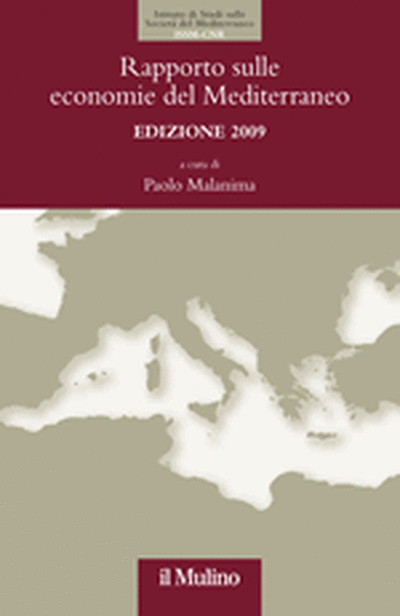
Rapporto sulle economie del Mediterraneo
Edizione 2009
edited by Paolo Malanima
In recent years, growth rates in the southern and eastern Mediterranean countries have on average been higher than those in the northern Mediterranean countries and the EU average. In several cases they exceeded 4 per cent, while in many advanced regions they rarely reached 2 per cent. While it is true that a rate of 4% is much lower than that of a country like China, it is nevertheless true that we are facing a gradual advance that contributes, year after year, to narrowing the economic gaps, which remain considerable. Certainly the current crisis, which is now affecting the least advanced countries in the global economy and, among them, those on the southern and eastern shores of the Mediterranean, may have serious negative repercussions on the weaker economies and accentuate development gaps. This is one of the main themes of the 2009 edition of the 'Report on Mediterranean Economies', edited by the National Research Council's Institute for Studies on Mediterranean Societies. The book is divided into ten chapters, which document the main economic indicators: population, migration, human development, foreign trade, productive and technological innovation, social policies, finance, energy production and consumption. Each chapter is accompanied by extensive up-to-date statistical documentation.
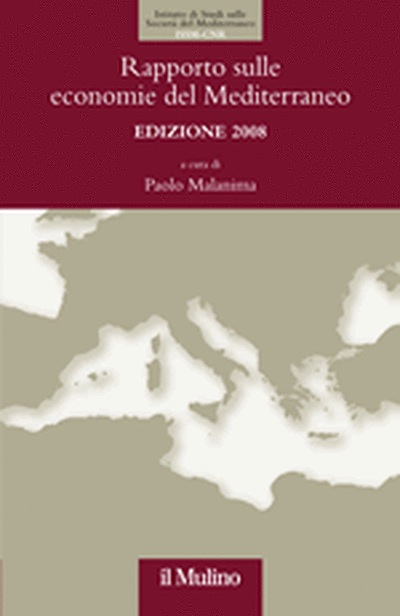
Rapporto sulle economie del Mediterraneo
Edizione 2008
edited by Paolo Malanima
Differences in the level of development of the Mediterranean economies are still strong. There is not only a gap between northern and southern countries. Within each area, there is considerable diversity: in economies, wage levels, population trends, emigration flows, economic policies, trade movement, techniques and innovation, and environmental protection. This fourth edition of the 'Report on Mediterranean Economies', prepared by the Institute for Studies on Mediterranean Societies of the National Research Council, aims to document and explain these differences by analysing the main economic indicators - from population, public accounts, innovation and technology, energy consumption, financial and trade flows, to environmental indicators. The chapters are accompanied by appendices that provide extensive up-to-date statistical documentation.
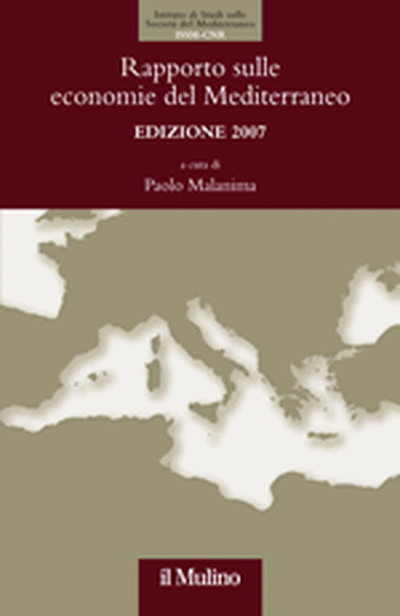
Rapporto sulle economie del Mediterraneo
Edizione 2007
edited by Paolo Malanima
What is the level of development of the different Mediterranean economies? What is the level of integration? What are the differences in economic and social conditions? What is the trade trend? What is the influence of national economic policies? These and other questions are answered in this third edition of the 'Report on Mediterranean Economies', prepared by the Institute for Studies on Mediterranean Societies of the National Research Council (ISSM-CNR). Its several chapters analyse the main economic indicators - population, output, public accounts, energy, living standards - and provide the most important and up-to-date statistical data on this composite universe in continuous transformation, helping to focus on the characteristics that distinguish the different areas into which it is divided.
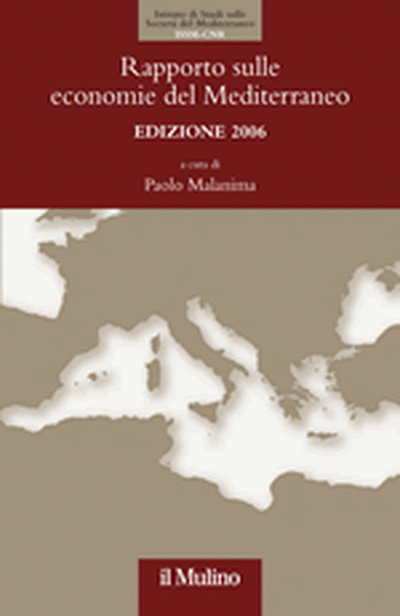
Rapporto sulle economie del Mediterraneo
Edizione 2006
edited by Paolo Malanima
What is the level of development of the different Mediterranean economies? What is their level of integration? What are the differences in economic and social conditions? What is the trade trend? What is the influence of national economic policies? These and other questions are answered in this second 'Report on Mediterranean Economies', prepared by the Institute for the Study of Mediterranean Societies of the National Research Council (ISSM-CNR). It aims to present a comprehensive, agile yet rigorous overview, rich in economic information and analysis, of all the Mediterranean countries. The up-to-date statistical information, which occupies a large part of the volume, makes available a range of data that would otherwise be difficult to find organically. The book thus fills a gap, allowing us to focus on the differences that distinguish the regions of this rapidly changing composite universe.
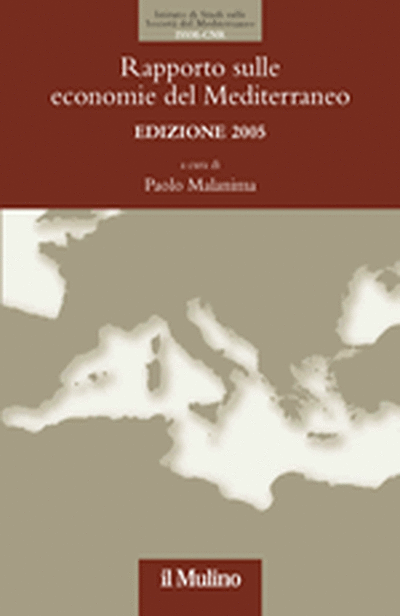
Rapporto sulle economie del Mediterraneo
Edizione 2005
edited by Paolo Malanima
What happens in the Mediterranean is important for understanding the global economy of today and tomorrow. But the regions that are part of this area, divided between three continents, have very different characteristics and a very modest degree of integration. This is why it is uncommon for the Mediterranean area to be examined as an 'economic whole', as it is in the 'Report on Mediterranean Economies', of which the 2005 edition is the first in a series of volumes to be produced each year by the Institute for Studies on Mediterranean Societies of the National Research Council (ISSM-CNR). The 'Report on the Economies of the Mediterranean' intends to present an agile, yet rigorous and rich overall picture of statistical information and economic analysis on all the Mediterranean countries, giving priority to up-to-date statistical information, which in fact occupies a large part of the book. The macroeconomic structure of the publication then allows us to focus on the differences that distinguish the regions of this rapidly changing composite universe.
